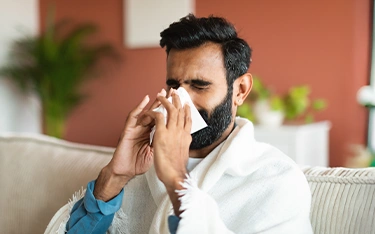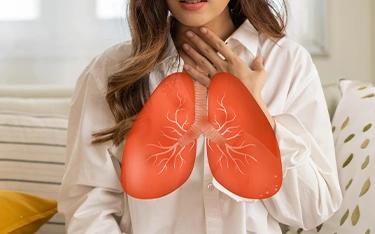Allergic rhinitis, commonly known as hay fever, affects a significant portion of the population, especially during certain seasons or in response to specific allergens like dust, pollen, or pet dander. Managing this condition naturally involves a combination of lifestyle changes, homeopathic treatments, and Ayurvedic practices.
The good news? It is manageable.
A 2023 report by the Indian Allergy Society revealed that more than 25% of Indians suffer from allergic rhinitis, with many unaware of how to manage it long-term.
If you are searching for real, sustainable ways to find relief, this guide will walk you through how to control allergic rhinitis naturally and effectively.
What Is Allergic Rhinitis and Why Does It Happen?
Allergic rhinitis is a condition where your immune system overreacts to allergens such as dust, pollen, mold, pet dander, or pollution. When exposed, your body releases histamine, leading to:
- Sneezing
- Runny or blocked nose
- Itchy eyes and throat
- Sinus pressure or facial pain
Unlike the common cold, these symptoms are recurrent and allergy-driven, not caused by infection.
So when people ask “How to manage allergic rhinitis?” it starts with understanding your triggers and managing your immune response.
Insights into global study
A study published in PubMed found that homeopathy significantly relieved seasonal allergy symptoms and enhanced overall quality of life, delivering effective results without any reported side effects when compared to a placebo.
Signs You May Be Ignoring
- Sneezing fits early in the morning
- Itchy throat that does not go away
- Constant nose rubbing or eye rubbing
- Nasal voice or mouth breathing at night
- Headache or fatigue after dust or weather change
- Recurring cold symptoms without fever
These are often misdiagnosed as “sensitive nose” or “change of weather,” but they may point to allergic rhinitis.
Dr Batra’s® pro tip:
Patients often focus on treating symptoms, but ignoring the triggers only worsens the condition. Managing allergic rhinitis is all about lifestyle plus targeted treatment.” — Dr. Akshay Mehta, Allergy & Respiratory Care Specialist
How to Manage Allergic Rhinitis: Simple Daily Tips
| Tip |
Why It Helps |
| Use a mask when indoors |
Helps block dust, pollen, and pollutants, reducing exposure to common allergens. |
| Rinse your nose with saline water |
Clears allergens from nasal passages and reduces inflammation, easing congestion. |
| Avoid soft toys, carpets, and heavy curtains |
These items can trap allergens and dust mites; minimizing them reduces allergen accumulation. |
| Keep windows shut during pollen season |
Prevents outdoor allergens like pollen from entering your living spaces. |
| Shower and change clothes after coming home |
Removes airborne allergens from skin and hair, preventing indoor contamination. |
| Drink warm fluids and use steam inhalation |
Helps clear nasal passages and soothe irritated mucous membranes. |
| Keep indoor air clean with purifiers |
Air purifiers, especially those with HEPA filters, can remove airborne allergens, improving air quality. |
These small habits make a big difference in how to control allergic rhinitis at home.




